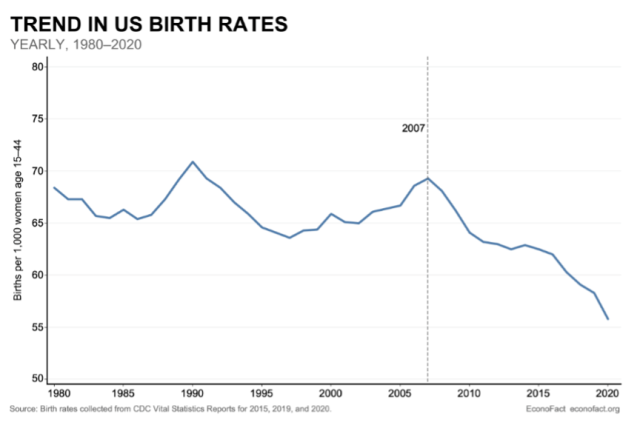
My husband, Tom Lynch, who writes “Letters from the Berkshires” on Substack, shared information today that surprised me: that since 2007 (the start of the Great Recession), the U.S. birthrate is going down at a faster rate than I’d ever realized.
My gut reaction was somewhat positive, because we are already putting so much strain on our resources and environment. But then, as we talked, and I did some more reading, I realized that if this decrease continues, it will hurt our country. We need people growing up to study and create new resources, to build and strengthen our economy, and to care for and support older generations.
Let’s ask ourselves why people don’t seem to want to have children. So far, there is more speculation than data.
There could be positive reasons, like women having more opportunities for satisfying careers and better ways to prevent pregnancies if people want to.
But based only on my own observations, I’m going to speculate that factors in the way we run our society are having a dampening effect on people’s decisions about starting families, factors such as: stagnant economic growth for anyone other than the very wealthy; the growing difficulty in creating intergenerational social mobility; inadequate and extremely costly child care; crippling student debt; and the trauma and anxiety of the last decade. And the overarching problem that creates and enables all these other factors? The culture of systemic racism in which we live. Lots of reasons for not bringing children into our communities.
Can we change this pattern? Only if we have the will and courage to act together. I suggest a few specific changes to start:
- Collective action to create affordable housing across all communities
- Concrete steps toward equity in education
- Legislative measures to reduce or eliminate student debt and make post-secondary education and training more accessible for all, and
- Legislative action to address the childcare crisis, including subsidizing costs and increasing compensation so people will enter that profession.
I realize I am suggesting we treat the symptoms, rather than the cause. But we can’t eliminate hundreds of years of racism with one great sweep of a hand, so I’m thinking we should focus on more limited changes. Even then, I don’t mean to minimize the difficulty of these actions. Accomplishing any one of them would be a huge step.
But what are the consequences if we don’t try?